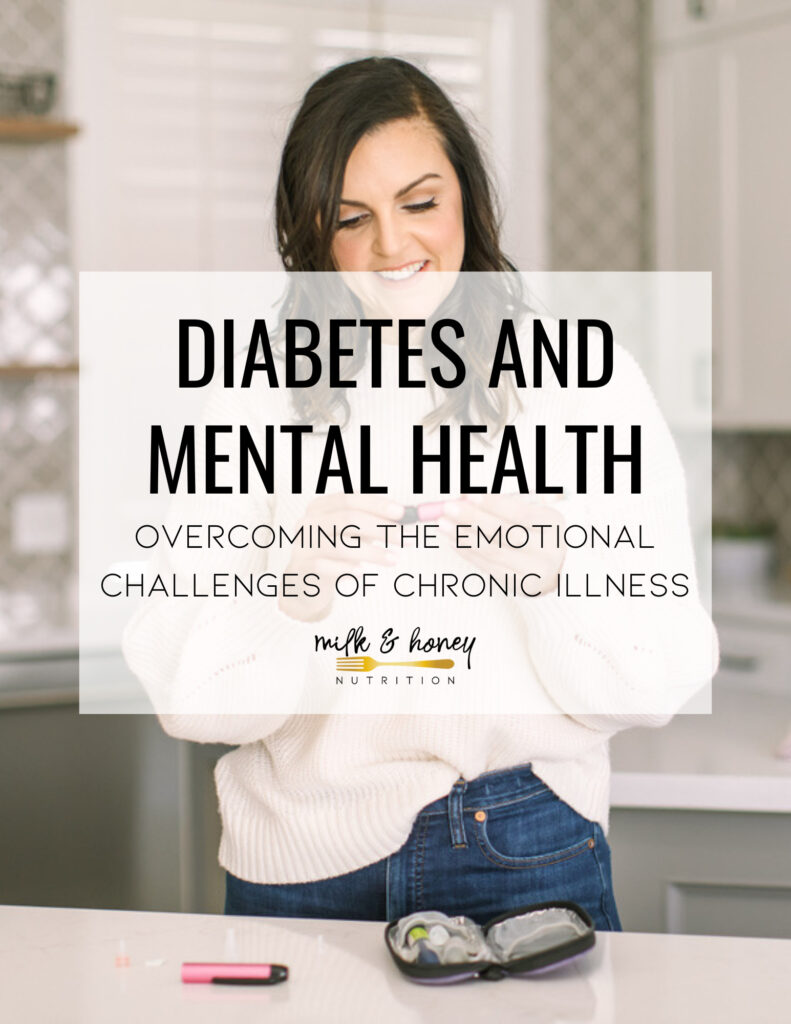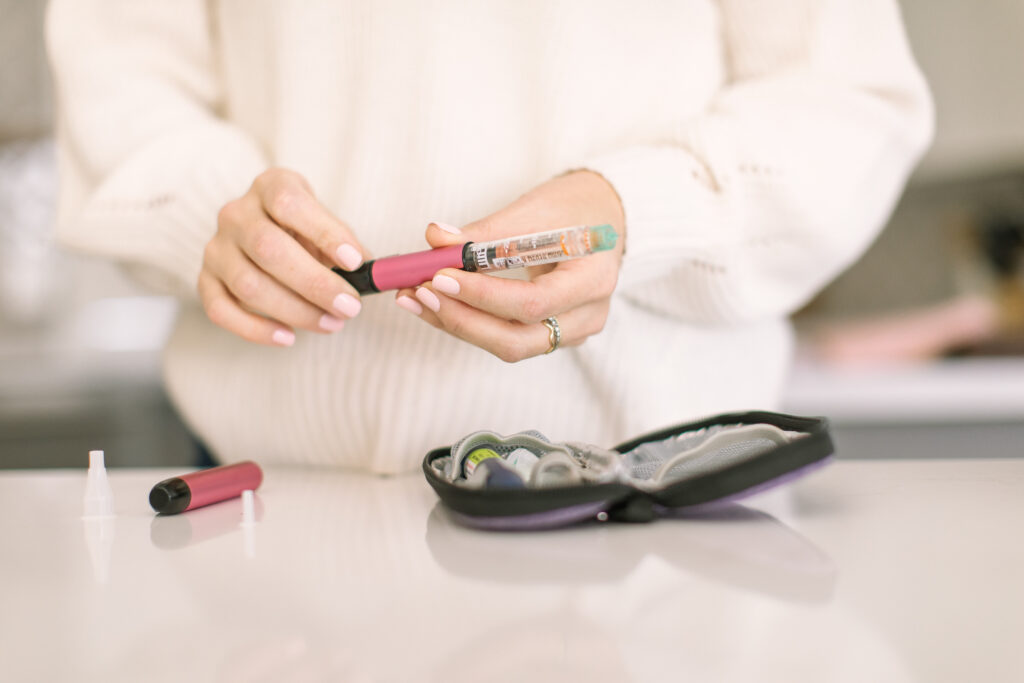
Diabetes impacts mental health, and mental health can impact diabetes management. In this article, we discuss the connection between diabetes and mental health, and tips to reduce the mental burden and emotional challenges of living with diabetes.
***This article is not intended to provide medical advice, diagnosis, opinion, treatment or services. This article and the links contained in it provide general information for educational purposes only. The information provided in this article is not a substitute for medical care or mental health care, and should not be used in place of the advice of your physician, metal health professional or registered dietitian.***
Are diabetes and mental health connected?
Yes, living with diabetes and mental health are connected. Diabetes is far more than a physical disease and monitoring and taking care of your mental health is just as important as your physical health. Poorly managed blood sugars can impact mental health and mental health conditions can impact blood sugar levels.
It is important to discuss your mental health with your health care professional and seek treatment if needed.
For me, taking care of my mental health while living with diabetes can range from something as simple as taking a break to play with my dog, to something more serious like seeking out counseling or assistance through medication.
Can stress affect blood sugar?
Whether it’s an in the moment intense physical stressor, a stressful experience at work, or getting sick, all forms of stress can impact people with diabetes. Stress and diabetes are related and can impact blood sugar levels.
Stress can cause a surge of hormones (such as cortisol, epinephrine, and norepinephrine). These hormones cause the heart to beat faster, an increase in blood pressure, heavy breathing, and a release of glucose into the blood stream… which raises blood sugar levels.
For a deeper dive into the impact of stress on diabetes, check out this post.
Does diabetes cause depression?
People with diabetes are 2-3x more likely to suffer from depression or experience depressive symptoms than someone without diabetes. And unfortunately, due to poor medical care or lack of access to medical care, less than half of people with diabetes who are depressed will get diagnosed and treated.
Treatment typically includes some form of counseling or therapy as well as medications when warranted. Symptoms usually improve with treatment, but if left untreated, depression often will get worse. The earlier depression is treated, the better diabetes-related outcomes will be.
If you feel like you may be experiencing symptoms of depression, talk to your healthcare team and ask for a referral to a professional who specializes in diabetes and mental health.
Can diabetes cause anxiety?
Due to the stressful nature of managing a life threatening condition day in and day out, people living with diabetes are 20% more likely to suffer from anxiety than the average person. Living with a chronic condition, like diabetes, increases the level fo stress you experience, as we described above. Anxiety can be a response to stress and presents as increased worry or fear as well as a constant level of feeling “on edge”.
Typically, anxiety symptoms respond better to counseling and therapies, but sometimes medication may also be needed and helpful.
Low blood sugar and anxiety
Low blood sugar levels and anxiety are intricately involved. Hypoglycemia (or low blood sugar) can feel like anxiety and anxiety symptoms can feel like your blood sugar is low. It’s important to test your blood sugar level anytime you suspect or feel like your blood sugar may be too low.
Many people may also feel anxiety and have fear about their blood sugar going low. As a result, some people intentionally have their blood sugar run higher. While your healthcare team may advise this strategy in certain situations, longterm high blood sugars can lead to diabetes-related complications such as neuropathy, retinopathy, and more.
If you feel like you may be experiencing symptoms of anxiety, talk to your healthcare team and ask for a referral to a professional who specializes in diabetes and mental health.
Impact of diabetes fatigue or burnout
Many people experience diabetes fatigue or burnout after managing diabetes for many years. (This is also sometimes called diabetes distress.) Diabetes burnout is characterized by a general feeling of apathy and/or not caring about diabetes management, and can lead to making poor decisions about your diabetes management… even stopping medications or regular blood sugar checks.
And, diabetes burnout can even happen after years of well-managed diabetes and blood sugar levels. In any 18-month timeframe, it’s estimated that one-third to half of people with diabetes will experience symptoms of diabetes burnout.
If you feel like you may be experiencing symptoms of diabetes burnout, talk to your healthcare team and ask for a referral to a professional who specializes in diabetes and mental health.

6 tips to improve your mental health with diabetes
The following tips and strategies may help you reduce the mental burden of some aspects of living with diabetes… which may help you maintain or improve your mental health status.
- Go for daily walks.
- Eat a balanced diet.
- Ask for 90 day supplies of your medications.
- Set up virtual doctor’s appointments.
- Order groceries online.
- Meal prep/plan.
Go for daily walks
Daily walks may help improve symptoms of depression and/or anxiety. Walking can also make blood sugar levels easier to manage, which also may help improve mental health status.
Eat a balanced diet
When you have diabetes, stable blood sugar levels mean more energy and better mental health. This goes for people with type 2 diabetes and any other type of diabetes. Balancing our meals and snacks with fat, fiber, and protein helps increase energy levels, promotes stable blood sugar levels, and may improve mental health status.
Ask for 90 day supplies of your medications
Something as simple as not having to remember to pick up your medications or supplies as often can reduce the mental burden of living with diabetes. Ask your insurance company if they will approve 90 day supply orders for your medications and supplies, instead of monthly.
Set up virtual doctor’s appointments
Sometimes, the burden of traveling to a doctor’s appointment can be a lot. See if your doctor will allow you to have virtual visits from the comfort of your home when appropriate.
Order groceries online
Many people living with diabetes experience symptoms of anxiety in the grocery store. They may not know where to start, what to buy, or how to put together a meal. Try ordering groceries online. This not only saves time, but can also reduce impulse purchases.
Meal prep/plan
Making last minute food decisions with diabetes can increase stress. Make a plan to for the week to help set you up for success and less stress.
Additional resources for diabetes and mental health
Check out these additional resources for more information on diabetes and mental health, and support.
- American Diabetes Association Mental Health Care Provider Locator
- National Alliance on Mental Illness Helpline
- Breakthrough T1D Community Summits and Support Groups
Sources
- https://www.cdc.gov/diabetes/living-with/mental-health.html \
- https://diabetes.org/health-wellness/mental-health
- https://diabetes.org/health-wellness/mental-health/are-you-experiencing-depression
- https://diabetes.org/health-wellness/mental-health/make-living-with-diabetes-easier
- https://www.nami.org/anxiety-disorders/type-2-diabetes-and-mental-health-exploring-the-connection/
- https://diabetesjournals.org/care/article/45/11/2753/147671/Management-of-Hyperglycemia-in-Type-2-Diabetes
- https://pubmed.ncbi.nlm.nih.gov/35147898/






One Response
Thanks so much for all the recipes, tips for managing and your blog which addresses anxiety around blood sugar levels and the management.
I was diagnosed in early June and have experienced stress and anxiety in many different ways and when I read your blogs I feel like I can breathe and continue on.